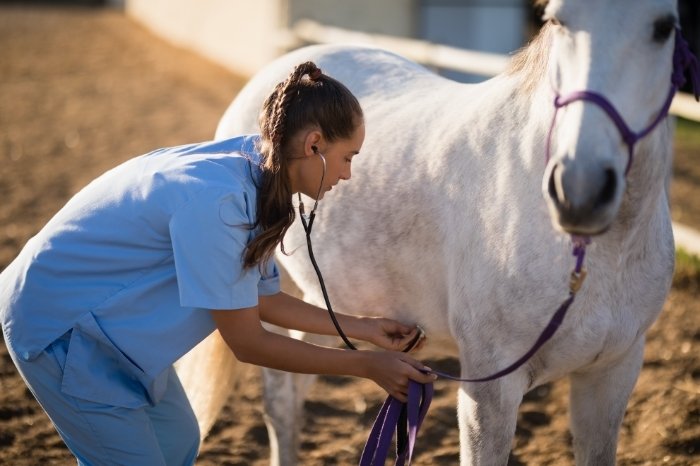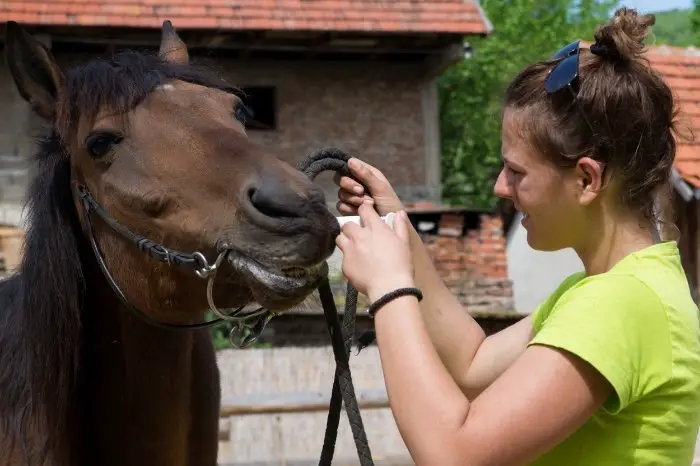Last Updated on February 20, 2022 by Griselda M.
Stomach ulcers are a common problem that many horses and ponies suffer from. If you own or care for an equine animal, it is important that you understand how to recognize and manage this painful condition. But what is the best ulcer treatment for horses?
With the correct care and attention, stomach ulcers in horses can be cured or the symptoms eased. Let’s learn all about this health disorder of horses and find out what ulcer treatments are available.
What Are Horse Stomach Ulcers?
Stomach ulcers in horses are a painful and debilitating health disorder. The correct name for this condition is equine gastric ulcer syndrome (EGUS).
Gastric ulcers are best described as sores that form on the stomach lining. If you’ve ever had a painful mouth ulcer, imagine that but on the inside of your stomach – ouch!
These painful ulcers are caused by the acidic fluid in the horse’s stomach. Normally, this acid sits in the lower half of the stomach and does not cause any problems. In EGUS, the acid splashes onto the upper half, where it causes painful sores.

This condition is very common in horses, with at least half of all horses thought to suffer with them at some point in their lives. Stomach ulcers occur most frequently in athletic competition horses, such as racing and endurance riding.
It is believed that during exercise, gastric acid production increases. This acidic fluid is then more likely to splash onto the delicate upper section of the stomach as the horse moves.
Read more about How To Measure The Gullet Of An English Saddle
What Are The Symptoms Of Ulcers In Horses?
The symptoms of ulcers in horses can be quite subtle, and often they will not be diagnoses until the sores are quite severe. It is important that any changes in your horse’s behavior are investigated, to help diagnose this painful condition. Early diagnosis and treatment will help to quickly reduce the severity of the symptoms.
Symptoms of EGUS in horses include:
- Reduced appetite
- Dull or lethargic demeanor
- A grumpy or miserable attitude
- Decreased performance
- Unwillingness to train
- Poor body condition or weight loss
- Dull coat
- Intermittent low-grade colic
- Biting when being saddled up
- Teeth grinding
If you spot any of these symptoms in your horse or pony, speak to your veterinarian. The best way to diagnose stomach ulcers is with a gastroscopy. This is where a camera is passed into the horse’s stomach to look for ulcers.
Alternatively, your veterinarian may prescribe treatment for EGUS without a gastroscopy, choosing instead to assess the clinical signs. If the horse responds well to treatment then it is likely that stomach ulcers were the cause of the problem.
Find Out What Is The Average Jockey Height and Weight?
How To Manage Signs Of Ulcers In Horses
Equine gastric ulcers are thought of as a man-made disease. Horses in the wild or living out at pasture rarely suffer from this painful disorder. Therefore, it is vital to make changes to how the horse is cared for in order to alleviate the symptoms of this condition.
The aim of treating horses with EGUS is to look after them in the most natural way possible. Horses evolved to graze continuously for most of the day, so they should be allowed access to hay or grass at all times. High grain diets should be avoided, as these will make your horse’s stomach ulcers worse.
If your horse is struggling to gain weight, then adding a high-calorie oil such as corn oil to the diet can help. Veterinarians also advise increasing the amount of alfalfa in the diet, too as much as 50%. Giving a small feed of alfalfa 30 minutes before exercise can help to reduce the amount of acid splashing onto the delicate stomach lining.
MagnaGard Performance Paste, Gastric Support with Electrolytes for Horses
Stress is a major cause of stomach ulcers in horses. Ways to reduce stress for your horse include making sure he has equine company, giving him time to relax and play in the field each day, and providing toys and treats to reduce boredom.
Certain medications, such as anti-inflammatory painkillers, must be avoided in horses with EGUS. Some feed supplements, especially those designed for horses with stomach ulcers, can help reduce the symptoms of this painful condition.
Check Out How To Size A Western Saddle For Your Horse
What Is The Best Ulcer Treatment For Horses?
The most common and effective treatment for stomach ulcers in horses is a drug called omeprazole. Your veterinarian may also refer to this drug as AbPrazole®. This medication is very expensive, but in most cases, it will completely cure this painful condition.
Omeprazole comes in paste form and is given once per day. It works by reducing the high levels of acid in the stomach, giving the ulcers chance to heal. It is normal to repeat the gastroscopy examination after one month of treatment, to check that the ulcers are healing.
Once the omeprazole has begun to take effect, the clinical symptoms of EGUS should start to subside. This can take some time, however, it is vital to persist with the medication until your horse starts to show some improvement.

If your horse does not respond to treatment or if the symptoms are very bad your veterinarian may recommend other medications. The other main medication used in the treatment of EGUS is sucralfate. This medication coats the ulcers in a protective layer, helping them to heal.
Summary
As we have learned, horse stomach ulcers, or EGUS, is a painful condition that commonly occurs in competition horses. If you are suspect that your horse has gastric ulcers, you need to seek veterinary advice as soon as possible. Stomach ulcers in horses can be easy to treat, however, the treatment is more effective if started as early as possible.
The best ulcer treatment for horses is omeprazole, an oral paste that can only be prescribed by your veterinarian. This treatment helps to reduce excessive acid production in the stomach. In severe cases, your veterinarian may also prescribe sucralfate to help the ulcers heal.
We’d love to hear about your experiences – does your horse suffer from gastric ulcers? Or maybe you have come across a different type of treatment for horses or ponies with EGUS? Add a comment below this post and we’ll get back to you!
